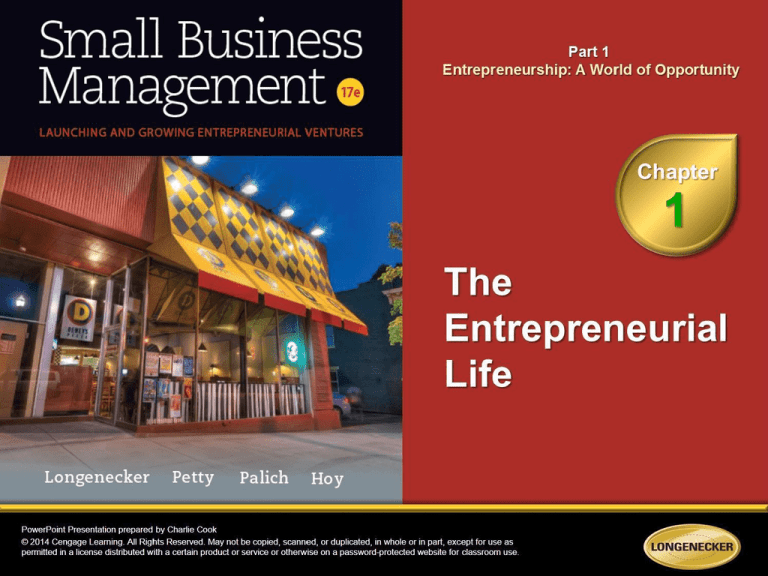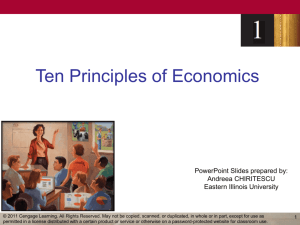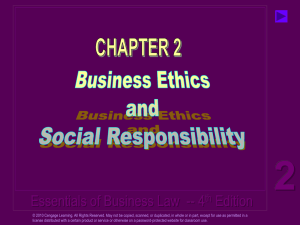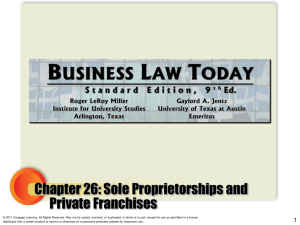
1. Explain the importance of small business and
entrepreneurship in our society.
2. Distinguish between the terms small business and
entrepreneurial opportunity.
3. Explain the basic characteristics of entrepreneurs, and
describe different kinds of entrepreneurship.
4. Discuss the importance of understanding your motivations
and perceptions related to owning a small business.
5. Describe five potential competitive advantages of small
entrepreneurial companies over large firms.
6. Explain the concept of an entrepreneurial legacy and its
challenges.
© 2014 Cengage Learning. All Rights Reserved. May not be copied, scanned, or duplicated, in whole or in part, except for use as
permitted in a license distributed with a certain product or service or otherwise on a password-protected website for classroom use.
1–2
The Contributions of Small Business
• Small Businesses:
Represent 99.7% of all firms.
Employ over 50% of employees in the private sector.
Account for 43% of private payrolls.
Outperform larger companies in net job creation.
Hire 43% of high-tech employees
Represent 97.3% of all exporters.
Provide increased business ownership opportunities
for minorities and self-employed degreed individuals.
© 2014 Cengage Learning. All Rights Reserved. May not be copied, scanned, or duplicated, in whole or in part, except for use as
permitted in a license distributed with a certain product or service or otherwise on a password-protected website for classroom use.
1–3
1.1
Number of Firms with Fewer than 500 Employees by Industry (2009)
© 2014 Cengage Learning. All Rights Reserved. May not be copied, scanned, or duplicated, in whole or in part, except for use as
permitted in a license distributed with a certain product or service or otherwise on a password-protected website for classroom use.
1–4
Small Business Growth Potential and Profits
• High-Potential Venture (Gazelle)
Has great prospects for growth
• Attractive Small Firm
Provides substantial profits
to its owner
• Microbusiness
Provides minimal profits
to its owner
• Lifestyle Business
Permits the owner to follow
a desired pattern of living
© 2014 Cengage Learning. All Rights Reserved. May not be copied, scanned, or duplicated, in whole or in part, except for use as
permitted in a license distributed with a certain product or service or otherwise on a password-protected website for classroom use.
1–5
What Is a Small Business?
• Criteria for Defining Smallness in Business
1. Small in size relative to larger competitors (fewer
than 100 employees)
2. Localized business operations (except marketing)
3. Financing supplied by one person or small group
4. Has the potential to become more
than a “one-person show”
© 2014 Cengage Learning. All Rights Reserved. May not be copied, scanned, or duplicated, in whole or in part, except for use as
permitted in a license distributed with a certain product or service or otherwise on a password-protected website for classroom use.
1–6
Entrepreneurial Opportunities
• Entrepreneurial Opportunity
An economically attractive and timely opportunity that
creates value for interested buyers or end users.
• Bootstrapping
Doing more with less in terms of resources invested
in a business, and, where possible, controlling the
resources without owning them.
• Success Stories
Table Occasions (El Paso, TX)
Blank Label (Boston, MA)
Tender Greens (Pasadena, CA)
© 2014 Cengage Learning. All Rights Reserved. May not be copied, scanned, or duplicated, in whole or in part, except for use as
permitted in a license distributed with a certain product or service or otherwise on a password-protected website for classroom use.
1–7
Who Are Entrepreneurs?
• Entrepreneurs are:
A person who starts and/or operates a business.
Individuals who discover market needs and launch
new firms to meet those needs.
Risk takers who provide an impetus for change,
innovation, and progress.
All active owner-managers
(founders and/or managers
of small businesses).
© 2014 Cengage Learning. All Rights Reserved. May not be copied, scanned, or duplicated, in whole or in part, except for use as
permitted in a license distributed with a certain product or service or otherwise on a password-protected website for classroom use.
1–8
Entrepreneurial Characteristics
(Timmons and Spinelli)
Commitment and
Determination
Motivation to
Excel
Creativity, SelfReliance, and
Adaptability
Leadership
Attitudes and
Behaviors of
Entrepreneurs
Opportunity
Obsession
Tolerance of Risk,
Ambiguity, and
Uncertainty
© 2014 Cengage Learning. All Rights Reserved. May not be copied, scanned, or duplicated, in whole or in part, except for use as
permitted in a license distributed with a certain product or service or otherwise on a password-protected website for classroom use.
1–9
Strong Commitment
to the Business
(Tenacity)
Strong
Locus of Control
(Self-Reliance)
Characteristics of
Successful
Entrepreneurs
Moderate Risk Takers
(Financial, Career,
Psychic Risks)
© 2014 Cengage Learning. All Rights Reserved. May not be copied, scanned, or duplicated, in whole or in part, except for use as
permitted in a license distributed with a certain product or service or otherwise on a password-protected website for classroom use.
1–10
How to Fail as an Entrepreneur
1. Overestimate what you can do
2. Lack an understanding of the market
3. Hire mediocre people
4. Fail to be a team player, which is usually the
result of taking oneself too seriously
5. Be a domineering manager
6. Fail to share ownership in the business in an
equitable way
© 2014 Cengage Learning. All Rights Reserved. May not be copied, scanned, or duplicated, in whole or in part, except for use as
permitted in a license distributed with a certain product or service or otherwise on a password-protected website for classroom use.
1–11
Varieties of Entrepreneurship
• Founder (“Pure” Entrepreneur)
A person who brings a new firm into existence
• “Second Stage” Entrepreneur
An administrative entrepreneur who overseas the
operations of a ongoing business
• Franchisee
An entrepreneur whose power is limited by the
contractual relationship with a franchising organization
• Entrepreneurial Team
Two or more people working together as entrepreneurs
Is becoming more common
© 2014 Cengage Learning. All Rights Reserved. May not be copied, scanned, or duplicated, in whole or in part, except for use as
permitted in a license distributed with a certain product or service or otherwise on a password-protected website for classroom use.
1–12
New Forms of Entrepreneurship
• Social Entrepreneurship
Is entrepreneurial activity whose goal is to find
innovative solutions to society’s most pressing needs,
problems, and opportunities.
• Social Entrepreneur
Seeks ways to solve societal and environmental
problems that incorporate the triple bottom line of
people, profits, and the planet.
© 2014 Cengage Learning. All Rights Reserved. May not be copied, scanned, or duplicated, in whole or in part, except for use as
permitted in a license distributed with a certain product or service or otherwise on a password-protected website for classroom use.
1–13
Women Entrepreneurs
• More Women Entrepreneurs
More women than men are starting new businesses
Many businesses are now majority female-owned
Movement of women into nontraditional industries
• Problems Facing Female Entrepreneurs
Discrimination and difficulties
related to gender
Lack of access to credit
Lack of networking connections
Balancing work and family life
© 2014 Cengage Learning. All Rights Reserved. May not be copied, scanned, or duplicated, in whole or in part, except for use as
permitted in a license distributed with a certain product or service or otherwise on a password-protected website for classroom use.
1–14
The Importance of Mentors
• Mentors
Are knowledgeable persons who can offer guidance
from their experience in a given field.
Teach entrepreneurs what and how to do.
Show them how to avoid mistakes.
Provide entrepreneurs encouragement
when needed.
© 2014 Cengage Learning. All Rights Reserved. May not be copied, scanned, or duplicated, in whole or in part, except for use as
permitted in a license distributed with a certain product or service or otherwise on a password-protected website for classroom use.
1–15
Your Motivations for Owning
a Business
• Being an entrepreneur:
Is extremely challenging.
Takes undying love and passion to keep going.
Can run in a family.
Can help make the world a better place.
Can make meaning in your life.
© 2014 Cengage Learning. All Rights Reserved. May not be copied, scanned, or duplicated, in whole or in part, except for use as
permitted in a license distributed with a certain product or service or otherwise on a password-protected website for classroom use.
1–16
Is Owning a Small Business
a Good Fit for You?
1. Am I passionate about my product or service?
2. What is my tolerance for risk?
3. Am I effective in making decisions?
4. Am I willing to take on numerous
responsibilities?
5. Will I be able to avoid burnout?
© 2014 Cengage Learning. All Rights Reserved. May not be copied, scanned, or duplicated, in whole or in part, except for use as
permitted in a license distributed with a certain product or service or otherwise on a password-protected website for classroom use.
1–17
Why People Become Entrepreneurs
• Reluctant Entrepreneur
A person who becomes an entrepreneur
as a result of some severe hardship.
• Refugee
A person who becomes an entrepreneur
to escape an undesirable situation.
© 2014 Cengage Learning. All Rights Reserved. May not be copied, scanned, or duplicated, in whole or in part, except for use as
permitted in a license distributed with a certain product or service or otherwise on a password-protected website for classroom use.
1–18
Artisan Entrepreneurs
• Artisan Entrepreneur
A person with primarily technical skills and little
business knowledge who starts a business
• Characteristics:
Take a paternalistic approach
Are reluctant to delegate
Use few sources of capital
Have a traditional marketing strategy
Focus on personal sales effort
Have a short planning horizon
© 2014 Cengage Learning. All Rights Reserved. May not be copied, scanned, or duplicated, in whole or in part, except for use as
permitted in a license distributed with a certain product or service or otherwise on a password-protected website for classroom use.
1–19
Opportunistic Entrepreneurs
• Opportunistic Entrepreneur
A person with both sophisticated managerial skills
and technical knowledge who starts a business
• Characteristics:
Broad-based education
Scientific approach to problems
Willing to delegate
Broad view of strategy
Diversified marketing approach
Longer planning horizon
Sophisticated accounting and financial control
© 2014 Cengage Learning. All Rights Reserved. May not be copied, scanned, or duplicated, in whole or in part, except for use as
permitted in a license distributed with a certain product or service or otherwise on a password-protected website for classroom use.
1–20
Millennial Entrepreneurs (Gen-Y)
• Have no fear of technology
• Are idealistic and optimistic
• Are more collaborative
• Build elements of community in the business
• Start companies while studying
entrepreneurship
• Fail fast, learn a lot, and
keep going
© 2014 Cengage Learning. All Rights Reserved. May not be copied, scanned, or duplicated, in whole or in part, except for use as
permitted in a license distributed with a certain product or service or otherwise on a password-protected website for classroom use.
1–21
1.2
Entrepreneurial Motivations
© 2014 Cengage Learning. All Rights Reserved. May not be copied, scanned, or duplicated, in whole or in part, except for use as
permitted in a license distributed with a certain product or service or otherwise on a password-protected website for classroom use.
1–22
1.3
Understanding Your Business Paradigm
© 2014 Cengage Learning. All Rights Reserved. May not be copied, scanned, or duplicated, in whole or in part, except for use as
permitted in a license distributed with a certain product or service or otherwise on a password-protected website for classroom use.
1–23
1.4
Understanding Your Business Paradigm
© 2014 Cengage Learning. All Rights Reserved. May not be copied, scanned, or duplicated, in whole or in part, except for use as
permitted in a license distributed with a certain product or service or otherwise on a password-protected website for classroom use.
1–24
The Competitive Edge of Entrepreneurs
Customer
Focus
Niche
Markets
Innovation and
Globalization
Competitive
Advantages of
Entrepreneurial
Firms
Quality
Performance
Integrity and
Responsibility
© 2014 Cengage Learning. All Rights Reserved. May not be copied, scanned, or duplicated, in whole or in part, except for use as
permitted in a license distributed with a certain product or service or otherwise on a password-protected website for classroom use.
1–25
Resources
Every small business owner should take advantage of the following
websites:
• U.S. Small Business Administration: www.sba.gov
• National Federation of Independent Business: www.nfib.com
• Global Entrepreneurship Monitor: http://gemconsortium.org/docs
• Marion Ewing Kauffman Foundation and the U.S. Commerce
Department: www.entrepreneurship.org
• SCORE, a network of more than 360 offices nationwide where
veteran small business executives offer free confidential advice
and mentoring: www.score.org
© 2014 Cengage Learning. All Rights Reserved. May not be copied, scanned, or duplicated, in whole or in part, except for use as
permitted in a license distributed with a certain product or service or otherwise on a password-protected website for classroom use.
1–26
Building an Entrepreneurial Legacy
• Looking Back At An Entrepreneurial Life
Proper values and actions lead to a good exit.
Evaluating accomplishments
• Winning the Wrong Game
The nature of the entrepreneurial endeavor reflects
personal goals and values.
• Crafting a Worthy Entrepreneurial Legacy
The tangible items and intangible qualities passed on
to both heirs and society.
• Satisfaction and Fulfillment
Achieving balance with what do I want to do.
© 2014 Cengage Learning. All Rights Reserved. May not be copied, scanned, or duplicated, in whole or in part, except for use as
permitted in a license distributed with a certain product or service or otherwise on a password-protected website for classroom use.
1–27
Key Terms
attractive small firm
bootstrapping
corporate refugee
entrepreneur
entrepreneur personality
entrepreneurial legacy
entrepreneurial opportunity
entrepreneurial team
founder
franchisee
high-potential venture
(gazelle)
lifestyle business
manager personality
mentor
microbusiness
microloans
niche market
paradigm shift
reluctant entrepreneur
small business
social entrepreneurship
technician personality
© 2014 Cengage Learning. All Rights Reserved. May not be copied, scanned, or duplicated, in whole or in part, except for use as
permitted in a license distributed with a certain product or service or otherwise on a password-protected website for classroom use.
1–28







